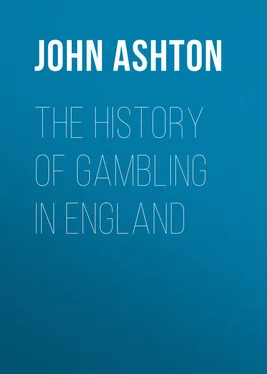John Ashton - The History of Gambling in England
Здесь есть возможность читать онлайн «John Ashton - The History of Gambling in England» — ознакомительный отрывок электронной книги совершенно бесплатно, а после прочтения отрывка купить полную версию. В некоторых случаях можно слушать аудио, скачать через торрент в формате fb2 и присутствует краткое содержание. Жанр: foreign_antique, foreign_prose, на английском языке. Описание произведения, (предисловие) а так же отзывы посетителей доступны на портале библиотеки ЛибКат.
- Название:The History of Gambling in England
- Автор:
- Жанр:
- Год:неизвестен
- ISBN:нет данных
- Рейтинг книги:5 / 5. Голосов: 1
-
Избранное:Добавить в избранное
- Отзывы:
-
Ваша оценка:
- 100
- 1
- 2
- 3
- 4
- 5
The History of Gambling in England: краткое содержание, описание и аннотация
Предлагаем к чтению аннотацию, описание, краткое содержание или предисловие (зависит от того, что написал сам автор книги «The History of Gambling in England»). Если вы не нашли необходимую информацию о книге — напишите в комментариях, мы постараемся отыскать её.
The History of Gambling in England — читать онлайн ознакомительный отрывок
Ниже представлен текст книги, разбитый по страницам. Система сохранения места последней прочитанной страницы, позволяет с удобством читать онлайн бесплатно книгу «The History of Gambling in England», без необходимости каждый раз заново искать на чём Вы остановились. Поставьте закладку, и сможете в любой момент перейти на страницу, на которой закончили чтение.
Интервал:
Закладка:
Still supposing the game of “Four Kings” to have been a game at cards, it seems strange that Chaucer, who was born fifty years afterwards, should not have made some mention of Cards as a pastime, for, in his Franklin’s Tale , he only mentions that “They dancen; and they play at ches and tables.” The first authentic date we have of playing Cards in England, shows that they had long been in use in 1463, and were manufactured here, for, by an Act of Parliament (3 Edward IV. cap. 4), the importation of playing cards was forbidden.
We get an early notice of cards temp Richard III. in the Paston letters 15 15 Edit. 1875 (Gairdner), vol. iii., p. 314.
from Margery Paston to John Paston, 24 Dec. 1484.
Ryght worschipful husbond, I recomaund me onto you. Plese it you to wete that I sent your eldest sunne to my Lady Morlee to have Knolage wat sports wer husyd in her hows in Kyrstemesse next folloyng after the decysse of my lord, her husbond; and sche seyd that ther wer non dysgysyngs, ner harpyng, ner syngyn, ner non lowd dysports, but playing at the tabyllys and schesse and cards. Sweche dysports sche gave her folkys leve to play and non odyr.”
Royalty was occasionally given to gambling, and we find among the private disbursements of Edward the Second such entries as:
“Item. paid to the King himself, to play at cross and pile, by the hands of Richard de Meremoth, the receiver of the Treasury, Twelve pence.
Item. paid there to Henry, the King’s barber, for money which he lent to the King, to play at cross and pile, Five shillings.
Item. paid there to Peres Barnard, usher of the King’s chamber, money which he lent to the King, and which he lost at cross and pile, to Monsieur Robert Wattewylle, Eight pence.
Item. paid to the King himself, to play at cross and pile, by Peres Barnard, two shillings, which the said Peres won of him.”
Also Royalty was fond of playing at cards, which, indeed, were popular from the highest to the lowest; and we find that James IV. of Scotland surprised his future bride, Margaret, sister to Henry VIII., when he paid her his first visit, playing at cards. 16 16 Leland’s Collectanea , vol. iii., Appendix, p. 284.
“The Kynge came privily to the said castell (of Newbattle) and entred within the chammer with a small company, where he founde the quene playing at the cardes.” And in the Privy purse expenses of Elizabeth of York, queen to Henry VII., we find, under date of 1502: “Item. to the Quenes grace upon the Feest of St Stephen for hure disporte at cardes this Christmas C.s. (100 shillings).” Whilst to show their popularity in this reign, it was enacted in 1494 (11 Hen. VII. c. 2), that no artificer labourer, or servant, shall play at any unlawful game (cards included) but in Christmas.
Shakespeare makes Henry VIII. play at Cards, for in his play of that name (Act v. sc. i.) there occurs, “And left him at Primero with the Duke of Suffolk”; whilst, in the Merry Wives of Windsor (Act iv. sc. 5), Falstaff says, “I never prosper’d since I forswore myself at Primero.” Stow tells us how, in Elizabeth’s time, “from All Hallows eve to the following Candlemas day, there was, among other sports, playing at Cards for counters, nails, and points, in every house, more for pastime than for gain.” When Mary was Princess, in her Privy Purse expenses there are numerous entries of money given her wherewith to play at cards.
CHAPTER II
Legislation as to Cards – Boy and sheep – Names of old games at Cards – Gambling temp. Charles II. – Description of a gaming-house, 1669 – Play at Christmas – The
Groom Porter – Royal gambling discontinued by George III. – Gambling in church.
Legislation about Cards was thought necessary in Henry VIII.’s time, for we see in 33 Hen. VIII., cap. 9, sec. xvi.: “Be it also enacted by the authority aforesaid. That no manner of artificer, or craftsman of any handicraft or occupation, husbandman, apprentice, labourer, servant at husbandry, journeyman, or servant of artificer, mariners, fishermen, watermen, or any serving man, shall from the said feast of the Nativity of St John Baptist , play at the tables, tennis, dice, cards, bowls, clash, coyting, logating, or any unlawful game, out of Christmas , under the pain of xx s. to be forfeit for every time,” &c. – an edict which was somewhat modified by sec. xxii., which provided “In what cases servants may play at dice, cards, tables, bowls, or tennis.”
This interference with the amusements of the people did not lead to good results, as Holinshed tells us (1526): “In the moneth of Maie was a proclamation made against all unlawfull games, according to the statute made in this behalfe, and commissions awarded to every shire for the execution of the same; so that, in all places, tables, dice, cards, and bouls were taken and burnt. Wherfore the people murmured against the cardinall, saieing: that he grudged at everie man’s plesure, saving his owne. But this proclamation small time indured. For, when yong men were forbidden bouls and such other games, some fell to drinking, some to feretting of other men’s conies, some to stealing of deere in parks and other unthriftinesse.”
With the exception of the grumbles of the Elizabethan puritans, such as Stubbes and others, we hear very little of card playing. Taylor, the “Water Poet,” in his Wit and Mirth gives a little story anent it, and mentions a game now forgotten. “An unhappy boy that kept his father’s sheepe in the country, did use to carry a paire 17 17 Pack.
of Cards in his pocket, and, meeting with boyes as good as himselfe, would fall to cards at the Cambrian game of whip-her-ginny, or English One and Thirty; at which sport, hee would some dayes lose a sheepe or two: for which, if his father corrected him, hee (in revenge), would drive the sheepe home at night over a narrow bridge, where some of them falling besides the bridge, were drowned in the swift brooke. The old man, being wearied with his ungracious dealing, complained to a Justice, thinking to affright him from doing any more the like. In briefe, before the Justice the youth was brought, where, (using small reverence and lesse manners), the Justice said to him: Sirrah, you are a notable villaine, you play at Cards, and lose your father’s sheepe at One and Thirty. The Boy replied that it was a lye. A lye, quoth the Justice, you saucy knave, dost thou give me the lye? No, qd the boy, I gave thee not the lye, but you told me the lye, for I never lost sheepe at One and Thirty; for, when my game was one and thirty, I alwayes woune. Indeed, said the Justice, thou saist true, but I have another accusation against thee, which is, that you drive your father’s sheepe over a narrow bridge where some of them are oftentimes drowned. That’s a lye, too, quoth the boy, for those that go over the bridge are well enough, it is only those that fall beside which are drowned: Whereto the Justice said to the boy’s father, Old man, why hast thou brought in two false accusations against thy soune, for he never lost sheepe at one and thirty, nor were there any drowned that went over the bridge.”
In Taylor’s Motto the same author names many other games at cards which were then in vogue: —
“The Prodigall’s estate, like to a flux,
The Mercer, Draper, and the Silk-man sucks;
The Taylor, Millainer, Dogs, Drabs and Dice,
They trip, or Passage, or the Most at thrice;
At Irish, Tick tacke, Doublets, Draughts, or Chesse
He flings his money free with carelessnesse:
At Novum, Mumchance, mischance (chuse ye which),
At One and Thirty, or at Poore and Rich,
Ruffe, Flam, Trump, Noddy, Whisk, Hole, Sant, New Cut,
Unto the keeping of foure Knaves, he’l put
His whole estate at Loadum, or at Gleeke,
At Tickle me quickly, he’s a merry Greeke,
At Primefisto, Post and Payre, Primero,
Maw, Whip-her-ginny, he’s a lib’rall Hero:
At My sow pigg’d; and (Reader, never doubt ye,
He’s skill’d in all games except), Looke about ye.
Bowles, Shove groate, Tennis, no game comes amiss,
His purse a purse for anybody is.”
Интервал:
Закладка:
Похожие книги на «The History of Gambling in England»
Представляем Вашему вниманию похожие книги на «The History of Gambling in England» списком для выбора. Мы отобрали схожую по названию и смыслу литературу в надежде предоставить читателям больше вариантов отыскать новые, интересные, ещё непрочитанные произведения.
Обсуждение, отзывы о книге «The History of Gambling in England» и просто собственные мнения читателей. Оставьте ваши комментарии, напишите, что Вы думаете о произведении, его смысле или главных героях. Укажите что конкретно понравилось, а что нет, и почему Вы так считаете.












